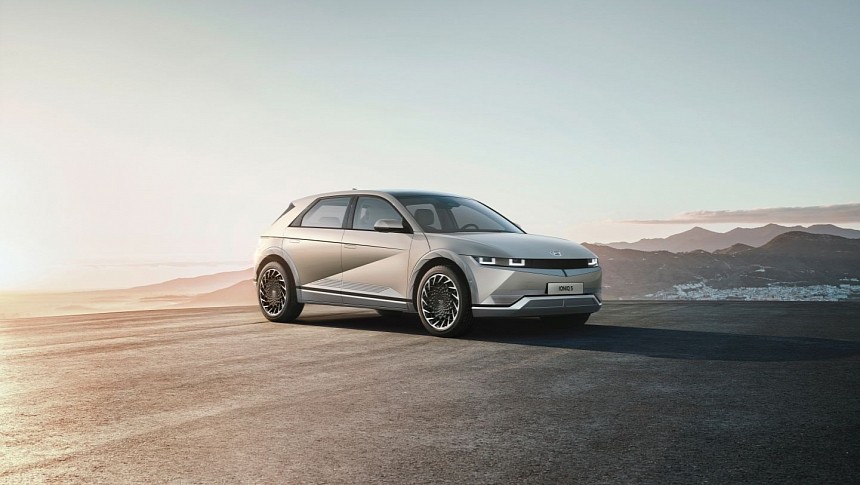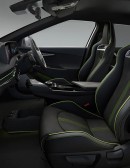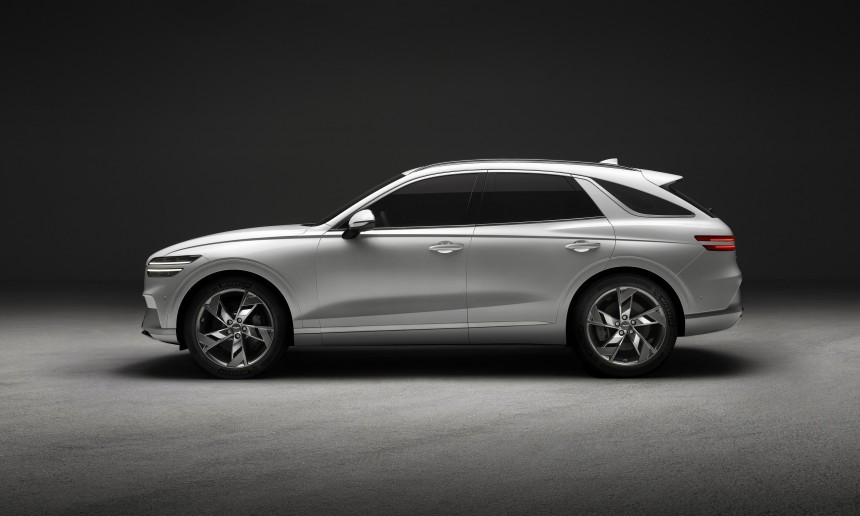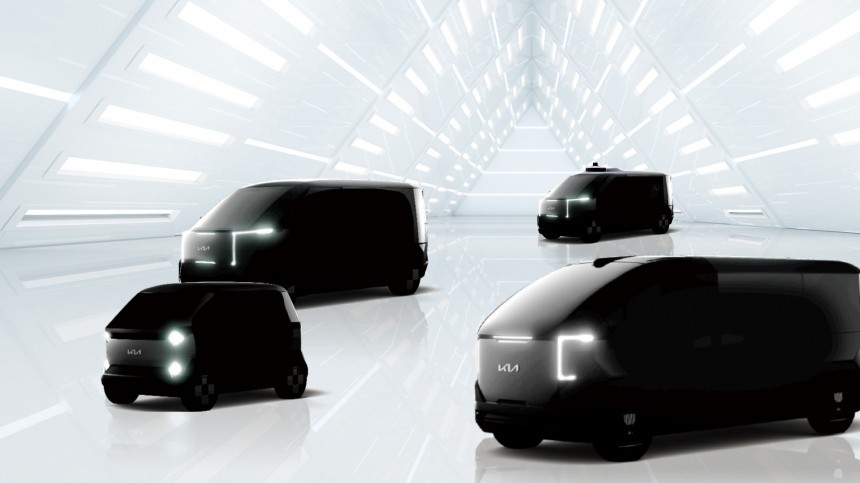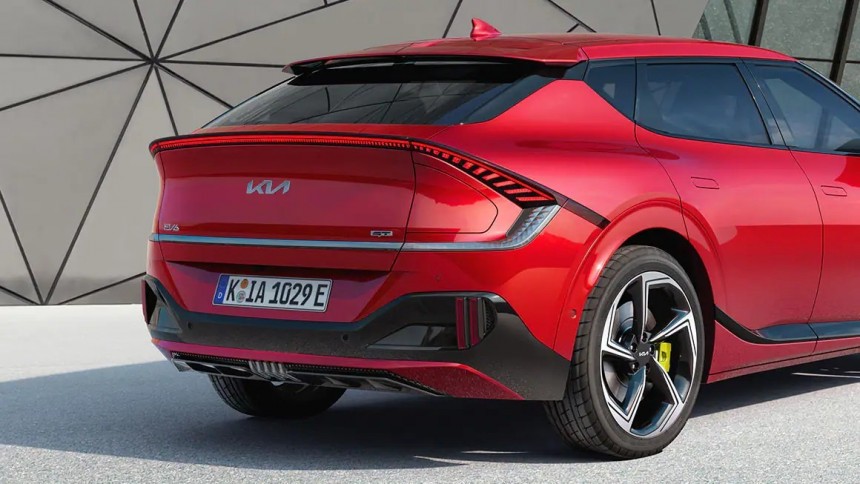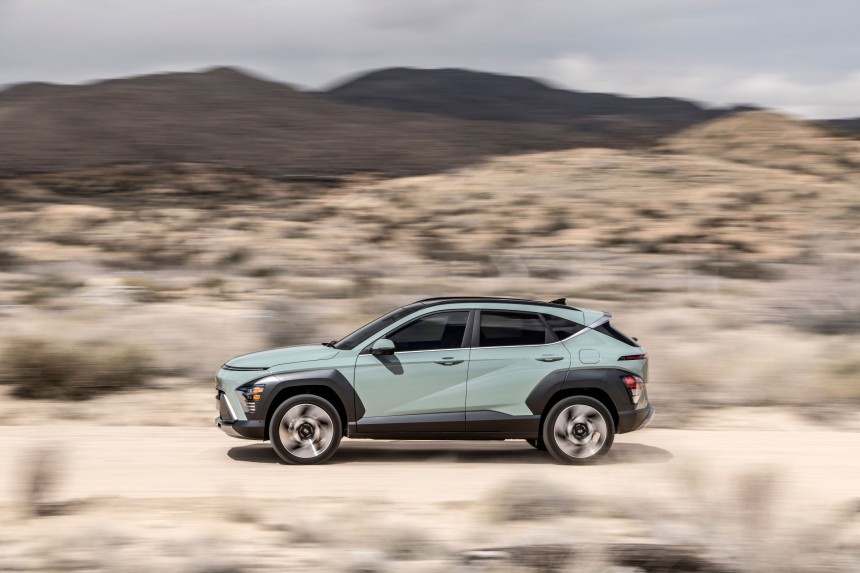Just like many automakers, Hyundai sees electrification as the future of mobility. Today, it announced very ambitious goals for the group, including its Kia and Genesis brand – to be part of the top three EV manufacturers in terms of EV sales, by the decade’s end. To back up this bold target, Hyundai also revealed how it plans to achieve it.
The Asian carmaker will invest a staggering 24 trillion KRW (around $18B) by 2030 to increase EV production and export and support domestic EV-related industries. The group targets an annual EV production in Korea of 1.51 million units, with a global volume of 3.64 million units by 2030.
The South Korean car company is targeting a premium buyer with its latest EVs, the most popular of which are the Ioniq 5 and Ioniq 6. Together, they recorded 100,000 units sold globally last year. The latter was introduced as one of the most efficient EVs on the market, boasting a range of up to 361 miles (581 km) and 140 combined MPGe. Using the Kona, Santa Fe, and the Ioniq 5 N, the company’s first high-performance EV, Hyundai diversifies its portfolio to cater to various customer needs and wants.
Genesis is Hyundai’s luxury vehicle division – the relatively new brand is also looking at electrification as a silver bullet. It includes a few EVs in its range of models, such as the electrified G80 luxury sedan, the GV70 all-electric SUV, and the GV60 CUV (Crossover Utility Vehicle). Regarding Kia, the brand currently has three all-electric vehicles: the EV6, the Niro EV, and the Soul EV.
This year, Kia will launch the EV9, its first three-row electric flagship SUV, while Hyundai Motor plans to release the Ioniq 7 next year. Hyundai says it will have a comprehensive lineup of 31 electric models in 2030, including Hyundai Motor, Kia, and Genesis models.
Kia announced it started building a plant dedicated to producing electric PEVs (purpose-built vehicles) and plans to invest around $758M to secure 99,000 acres of land. It’s also expanding the existing EV lines at plants to grow manufacturing capabilities. Before we go any further, let me tell you what PBVs are. Hyundai describes them as eco-friendly multi-purpose vehicles intended to meet customers’ business purposes and needs.
The new PBV plant will utilize innovative manufacturing technologies while also keeping sustainability in mind by minimizing carbon emissions. Furthermore, it will operate a dry booth, an eco-friendly construction method, during the painting process of vehicle manufacturing. Using natural light and streamlining the production process will decrease carbon emissions by 20% compared to existing factories.
Hyundai Motor and Kia’s smart factory brand “E-FOREST technologies” will supply efficient and intelligent features, such as digital manufacturing systems. For instance, one of the groundbreaking manufacturing processes that will be implemented at the plant is the “Cellular (or cell) method,” allowing vehicle production to be customized depending on clients’ needs.
Long story short, this process layout strategy groups together machines or workstations that produce similar parts or products and creates a more efficient and flexible dynamic by reducing the distance these components need to travel during production. Other desirable effects are minimized downtimes, reduced costs, and more productivity.
AI (artificial intelligence) and automation will also play a significant role in the production process – the technologies will be used for painting quality inspection, installation of parts, and real-time automatic measurement quality data analysis.
And lastly, Kia will design the new plant as “human friendly.” It will do so by using automation for heavy-duty work while also creating tasks that require looking up at the ceiling, improving the feeling of openness, and minimizing noise levels.
The first battery electric PBV is scheduled to start production in 2025 – the company dubbed it SW, although that’s just the project name. It will be a mid-sized PBS based on the “eS” platform. The vehicle is engineered to fulfill various business demands, such as ride-hailing, deliveries, or B2B transactions via a spacious indoor space and efficient load structure.
Kia plans to extend its line-up to larger-sized PBVs for logistics, multi-seat shuttles, and food delivery, as well as small-sized and mid-sized vehicles incorporating autonomous driving technology. The brand wants to achieve production of 150,000 units in the first full year.
Now back to Hyundai’s plans – the automotive group is significantly investing in R&D and creating a platform for its next-gen EVs, expanding product line-ups, building new research facilities, and developing advanced technologies. It’s also aiming to improve the hardware and software of EVs, including systems such as batteries and motors, and other components that play a significant role in determining a vehicle’s range.
Dedicated platforms for each vehicle class will be developed under the Integrated Modular Architecture (IMA) system, including the “eM, “engineered solely for passenger EVs and scheduled to be introduced in two years.
To support these ambitious vehicle developments, Hyundai is also preparing a high-speed charging infrastructure for maximum convenience while expanding existing ones in Korea. For example, Hyundai launched the high-speed EV-charging brand E-pit two years ago and introduced the E-pit Charging Service Platform (E-CSP) in 2022.
The group is very keen on strengthening the competitiveness of the Korean automotive industry and the future automotive era – it’s doing so by launching various partnerships and supporting suppliers via heavy investments, thus accelerating the electrification shift of the auto parts industry. For instance, it operated a program of KRW 5.2 trillion ($3.9B) to support suppliers in their liquidity and profit and loss.
Tesla is the leader in e-mobility across the globe, and it’s far ahead of its competitors when it comes to the sales of BEVs. But let’s suppose Hyundai refers to any electrified vehicle, hybrid or battery. In 2022, the Chinese automaker BYD topped the charts with more than 1.8 million units sold. Hyundai wasn’t even in the top five companies, but considering its heavy investments and seven years until 2030 for their effects to come to fruition, there’s a chance for the South Korean brand to achieve its goal.
The South Korean car company is targeting a premium buyer with its latest EVs, the most popular of which are the Ioniq 5 and Ioniq 6. Together, they recorded 100,000 units sold globally last year. The latter was introduced as one of the most efficient EVs on the market, boasting a range of up to 361 miles (581 km) and 140 combined MPGe. Using the Kona, Santa Fe, and the Ioniq 5 N, the company’s first high-performance EV, Hyundai diversifies its portfolio to cater to various customer needs and wants.
Genesis is Hyundai’s luxury vehicle division – the relatively new brand is also looking at electrification as a silver bullet. It includes a few EVs in its range of models, such as the electrified G80 luxury sedan, the GV70 all-electric SUV, and the GV60 CUV (Crossover Utility Vehicle). Regarding Kia, the brand currently has three all-electric vehicles: the EV6, the Niro EV, and the Soul EV.
This year, Kia will launch the EV9, its first three-row electric flagship SUV, while Hyundai Motor plans to release the Ioniq 7 next year. Hyundai says it will have a comprehensive lineup of 31 electric models in 2030, including Hyundai Motor, Kia, and Genesis models.
The new PBV plant will utilize innovative manufacturing technologies while also keeping sustainability in mind by minimizing carbon emissions. Furthermore, it will operate a dry booth, an eco-friendly construction method, during the painting process of vehicle manufacturing. Using natural light and streamlining the production process will decrease carbon emissions by 20% compared to existing factories.
Hyundai Motor and Kia’s smart factory brand “E-FOREST technologies” will supply efficient and intelligent features, such as digital manufacturing systems. For instance, one of the groundbreaking manufacturing processes that will be implemented at the plant is the “Cellular (or cell) method,” allowing vehicle production to be customized depending on clients’ needs.
Long story short, this process layout strategy groups together machines or workstations that produce similar parts or products and creates a more efficient and flexible dynamic by reducing the distance these components need to travel during production. Other desirable effects are minimized downtimes, reduced costs, and more productivity.
And lastly, Kia will design the new plant as “human friendly.” It will do so by using automation for heavy-duty work while also creating tasks that require looking up at the ceiling, improving the feeling of openness, and minimizing noise levels.
The first battery electric PBV is scheduled to start production in 2025 – the company dubbed it SW, although that’s just the project name. It will be a mid-sized PBS based on the “eS” platform. The vehicle is engineered to fulfill various business demands, such as ride-hailing, deliveries, or B2B transactions via a spacious indoor space and efficient load structure.
Kia plans to extend its line-up to larger-sized PBVs for logistics, multi-seat shuttles, and food delivery, as well as small-sized and mid-sized vehicles incorporating autonomous driving technology. The brand wants to achieve production of 150,000 units in the first full year.
Dedicated platforms for each vehicle class will be developed under the Integrated Modular Architecture (IMA) system, including the “eM, “engineered solely for passenger EVs and scheduled to be introduced in two years.
To support these ambitious vehicle developments, Hyundai is also preparing a high-speed charging infrastructure for maximum convenience while expanding existing ones in Korea. For example, Hyundai launched the high-speed EV-charging brand E-pit two years ago and introduced the E-pit Charging Service Platform (E-CSP) in 2022.
The group is very keen on strengthening the competitiveness of the Korean automotive industry and the future automotive era – it’s doing so by launching various partnerships and supporting suppliers via heavy investments, thus accelerating the electrification shift of the auto parts industry. For instance, it operated a program of KRW 5.2 trillion ($3.9B) to support suppliers in their liquidity and profit and loss.
